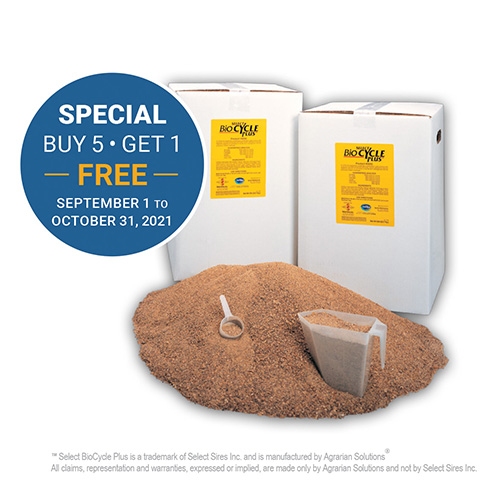Navigating the Transition Period with Select BioCycle Plus™

By: Larry Roth, Ph.D., PAS, Associate Vice President, Science and Technology
The transition period from 3 weeks pre-calving to 3 weeks post-freshening poses tremendous immune, inflammatory and digestive challenges to all dairy cows. The ability of the cow to respond to and handle the multitude of challenges during the critical 6-week transition period determines whether she reaches her genetic potential for milk production, re-breeds on a timely basis, and remains in the herd or is culled.
Perhaps the most important battlegrounds during the transition period are the mucosal membranes of the digestive, reproductive and respiratory tracts. Maintaining the integrity of the epithelial cells lining these tracts is necessary to prevent pathogenic organisms and mycotoxins from entering the cow’s body to cause inflammation and immune challenges. Fueling and supporting the inflammation and immune challenges diverts nutrients from growth, body replenishment, milk production and reproduction. Further, not successfully responding to early lactation health challenges enables these problems to persist on into the lactation period, which are then evidenced by lower production, failed breedings, abortions, and, potentially, death.
Variable feed quality, or less than ideal feed hygiene, can disrupt ruminal fermentation and nutrient absorption. Maximizing feed quality and stabilizing feed hygiene is necessary for assisting cows through the transition period and on to a successful lactation.
Case studies (available from Agrarian Solutions) document the production, health and reproduction benefits of supplementing Select BioCycle Plus™ to transition cows, especially those experiencing mycotoxin or pathogen loads.
BioCycle Plus is formulated to uniquely assist the cow in defense against the multitude of challenges during transition and set the stage for production, reproduction and remaining in the herd.
L-form bacteria: Proprietary processes allow the selection and development of three strains cell wall-deficient bacteria, commonly referred to as L-form bacteria.
Strain #1: Establishes residence in the mucous lining the digestive tract to down-regulate the inflammation response and enhance humoral immune production against pathogens.
Strain #2: Also colonizes the digestive tract’s mucosal lining to secrete organic acids to stabilize GI tract pH to protect the epithelial cells from pathogens, while facilitating digesta fermentation and nutrient absorption.
Strain #3: This L-form strain is 1/50 to 1/100 the size of the original bacteria, and is therefore able to penetrate the digestive epithelial cell membranes to trigger cellular export transport proteins which can remove absorb foreign compounds, such as mycotoxins, from the cell contents for maintaining epithelial integrity and preventing absorption into the body..
Specialized proteins: Egg-derived proteins to protect digestive epithelial cells from specific pathogenic bacteria and viruses.
Live cell yeast and yeast culture: Promote digesta fermentation and feed intake.
Enzymes: Enhancing digesta fermentation and providing nutrients for beneficial bacteria is critical meeting the transition cow’s nutrient demands.
Contact Agrarian Solutions for information on BioCycle Plus and supporting case studies.
